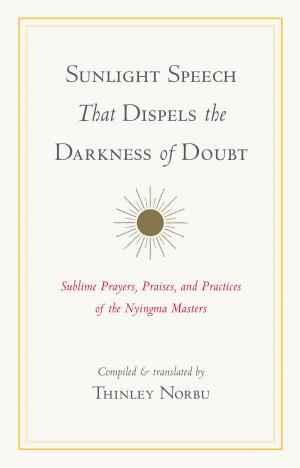Ten Gates
The Kong-an Teaching of Zen Master Seung Sahn
Nonfiction, Religion & Spirituality, Philosophy, Zen, Eastern Religions, Zen Buddhism, Inspiration & Meditation, Spirituality| Author: | Seung Sahn | ISBN: | 9780834826854 |
| Publisher: | Shambhala | Publication: | August 14, 2007 |
| Imprint: | Shambhala | Language: | English |
| Author: | Seung Sahn |
| ISBN: | 9780834826854 |
| Publisher: | Shambhala |
| Publication: | August 14, 2007 |
| Imprint: | Shambhala |
| Language: | English |
Zen is famous for koans (called kong-ans in Korean, and in this book), those bizarre and seemingly unanswerable questions Zen masters pose to their students to check their realization (such as "What is the sound of one hand clapping?"). Fear of koans keeps some people from ever giving Zen practice a try. But here, through the experience of seeing a modern Zen master work with his students, you can see what koan training is really like: It’s a skillful, lively practice for attaining wisdom.
This book presents the system of ten koans that Zen Master Seung Sahn came to call the "Ten Gates." These koans represent the basic types one will encounter in any course of study. Each of the ten gates, or koans, is illuminated by actual interchanges between Zen Master Seung Sahn and his students that show what the practice is all about: it is above all a process of coming to trust one’s own wisdom, and of manifesting that wisdom in every koan-like situation life presents us with.
For more information on the author, Zen Master Seung Sahn, visit his website at www.kwanumzen.com.
Zen is famous for koans (called kong-ans in Korean, and in this book), those bizarre and seemingly unanswerable questions Zen masters pose to their students to check their realization (such as "What is the sound of one hand clapping?"). Fear of koans keeps some people from ever giving Zen practice a try. But here, through the experience of seeing a modern Zen master work with his students, you can see what koan training is really like: It’s a skillful, lively practice for attaining wisdom.
This book presents the system of ten koans that Zen Master Seung Sahn came to call the "Ten Gates." These koans represent the basic types one will encounter in any course of study. Each of the ten gates, or koans, is illuminated by actual interchanges between Zen Master Seung Sahn and his students that show what the practice is all about: it is above all a process of coming to trust one’s own wisdom, and of manifesting that wisdom in every koan-like situation life presents us with.
For more information on the author, Zen Master Seung Sahn, visit his website at www.kwanumzen.com.















